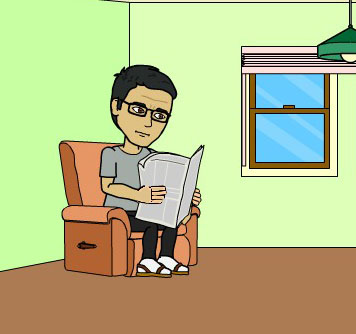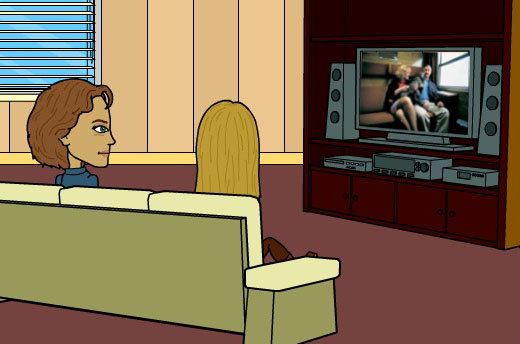Lesson 2
In this lesson, you’ll learn:
VOCABULARY AND PHRASES
- Basic verbs
- Basic nouns
GRAMMAR:
- Negation
- Verb conjunction
- Accusative case

M: Cześć Gosia! Co robisz?
G: Cześć! Czytam książkę.
M: Ona nie jest po polsku?
G: Nie, jest po włosku.
M: Znasz włoski?
G: Tak, jestem tłumaczką. A ty kim jesteś z zawodu?
M: Jestem informatykiem....A gdzie mieszkasz?
G: Teraz mieszkam we Wrocławiu, ale pochodzę z Poznania. A ty?
M: Ja od zawsze mieszkam we Wrocławiu.
G: O, już późno. Idę. Do zobaczenia.
M: Do zobaczenia.
|
Co robisz? |
What are you doing? |
|
|
robić |
to do |
|
|
czytać |
to read |
|
|
książka |
a book |
|
|
po polsku |
in Polish |
|
|
po włosku |
In Italian |
|
|
nie |
no / not |
|
|
znać |
to know |
|
|
Kim jesteś z zawodu? |
What’s your profession? |
|
|
mieszkać |
to live (to reside) |
|
|
pochodzić z |
to come from |
|
|
od zawsze |
since always |
|
|
Już późno. |
It’s already late. |
|
|
iść |
to go (to walk) |
|
|
Do zobaczenia. |
See you. |
Verb Inflection:
In the dialogue you’ve come across the next set of verbs:
robić, czytać, znać, mieszkać, iść
and you’ve seen them inflected. Learners of Polish might ask if there are some conjugation rules at all. The answer is yes answer is yes, there are – but trying to master them might be very discouraging. There are 11 types of conjugation and some have further subdivisions.
When learning Polish it’s better to learn in a more spontaneous way – like children do. Just learn the inflection of most common verbs without too much care about classifying them. With time you’ll get it automatized and you’ll gain some language intuition. Then you’ll be able to do some generalization of rules and apply the rules to new verbs. Just relax and EXPLORE!
czytać, znać, mieszkać follow the same pattern (group I)
|
infinitive |
|
czytać |
znać |
mieszkać |
|
1. person sing. |
-am |
czytam |
znam |
mieszkam |
|
2. person sing. |
-asz |
czytasz |
znasz |
mieszkasz |
|
3. person sing. |
-a |
czyta |
zna |
mieszka |
|
1 person pl. |
-amy |
czytamy |
znamy |
mieszkamy |
|
2 person pl. |
-acie |
czytacie |
znacie |
mieszkacie |
|
3 person pl. |
-ają |
czytają |
znają |
mieszkają |
mieć (although it has different infinitive form) behaves in the same way
|
infinitive |
mieć |
|
1. person sing. |
mam |
|
2. person sing. |
masz |
|
3. person sing. |
ma |
|
1 person pl. |
mamy |
|
2 person pl. |
macie |
|
3 person pl. |
mają |
robić represents another group of verbs that end in –ę in 1.person singular (There is actually no other option, the verb in 1.person singular will always end in –ę or –m.)
|
infinitive |
|
robić |
|
1. person sing. |
-ę |
robię |
|
2. person sing. |
-isz |
robisz |
|
3. person sing. |
-i |
robię |
|
1 person pl. |
-imy |
robimy |
|
2 person pl. |
-icie |
robicie |
|
3 person pl. |
-ą |
robią |
iść might be considered as irregular
|
infinitive |
iść |
|
1. person sing. |
idę |
|
2. person sing. |
idziesz |
|
3. person sing. |
idzie |
|
1 person pl. |
idziemy |
|
2 person pl. |
idziecie |
|
3 person pl. |
idą |
A very good place to find almost all the inflections is:
Negations:
It’s easy to form negations in Polish. Just put “nie” before the verb.
Nie jestem głodny.
On nie mieszka tutaj.
Nie mówię po polsku.
Related interactive test: Verb inflections.» take the interactive test
Accusative case
The accusative case is used to mark the direct object of a transitive verb. In simpler words – when a given item (or person) is the object of our action, then the word is used in the accusative case. The action might be taking, reading, giving, reading, beating, cooking, watching or even having as well as many others.
 Marek czyta gazetę. (Marek is reading a newspaper.)
Marek czyta gazetę. (Marek is reading a newspaper.)
 Tomek bierze kąpiel. (Tomek is having /literally: taking/ a bath.)
Tomek bierze kąpiel. (Tomek is having /literally: taking/ a bath.)
 Gosia je śniadanie. (Gosia is eating breakfast.)
Gosia je śniadanie. (Gosia is eating breakfast.)
 Ania wysyła list. (Ania is sending a letter.)
Ania wysyła list. (Ania is sending a letter.)
 Ania i Gosia oglądają telewizję. (Ania and Gosia are watching TV).
Ania i Gosia oglądają telewizję. (Ania and Gosia are watching TV).
(On the TV screen you can see a frame from a Polish comedy “Dzień świra” – it is highly recommended that you see it)
NOTE: Polish has one present tense, so it can function both as English present continuous and present simple.
Fortunately, it’s quite easy to form accusative forms. When a singular noun ends in a, change it to ę. When it has another ending, don’t change it.
Different declination applies to animate masculine nouns (for people and animals). Then add –a to the basic form.
Some other nouns of foreign origin might also belong to this group (banan, pomidor, e-mail, drink, hamburger).
In plural, the form stays the same as nominative with exception of nouns referring to people.
For more details refer to the article:
Related interactive test: Accusative case.» take the interactive test
Related interactive test: vocabulary in accusative - fun test.» take the interactive test
Related interactive test: Revision - lesson 2.» take the interactive test
 LearnPolish
LearnPolish